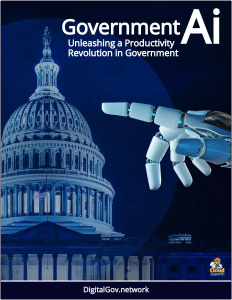Scaling Government AI Through Partnership and Strategy
OpenAI’s approach includes both secure enterprise offerings and tools like ChatGPT Gov, built specifically for secure use in defense and intelligence environments.
 Felipe Millon of OpenAI detailed how public sector organizations are transitioning from pilot programs to scaled implementations of AI, and how strong partnerships make the difference.
Felipe Millon of OpenAI detailed how public sector organizations are transitioning from pilot programs to scaled implementations of AI, and how strong partnerships make the difference.
Citing the Commonwealth of Pennsylvania’s success using ChatGPT Enterprise to save eight hours per week per employee, Millon highlighted how early adopters are demonstrating real value.
He emphasized that scaling requires both top-down strategy and bottom-up enablement, and pointed to barriers like cybersecurity authorization and procurement as persistent challenges.
OpenAI’s approach includes both secure enterprise offerings and tools like ChatGPT Gov, built specifically for secure use in defense and intelligence environments. Millon stressed that waiting too long to start is not a viable strategy, given the rapid evolution of reasoning models and new capabilities. Instead, he encouraged agencies to begin using tools today and grow with the technology.
Key Takeaways
- Successful scale requires both strategic vision and user enablement.
- Authorization and procurement remain hurdles but can be overcome.
- AI maturity accelerates when agencies start using tools early.
OpenAI in Government
Governments, particularly in the U.S., are increasingly adopting OpenAI’s technologies, notably ChatGPT, to enhance efficiency and productivity in public sector operations. Here’s a summary of key uses based on available information:
- ChatGPT Gov Deployment: OpenAI launched ChatGPT Gov in January 2025, a specialized version of ChatGPT tailored for U.S. federal, state, and local agencies. It allows secure handling of sensitive, non-public data within Microsoft Azure’s government cloud, adhering to strict cybersecurity standards like FedRAMP, IL5, CJIS, and ITAR. Over 90,000 users across 3,500 U.S. government agencies have generated more than 18 million messages since 2024, using it for tasks like document summarization, policy drafting, coding, and application development.
- Federal Agency Adoption: Agencies like the National Gallery of Art, NASA, the IRS, and the Air Force Research Laboratory have integrated ChatGPT Enterprise or Gov for tasks such as administrative automation, research, and coding. For example, the IRS uses 150 licenses within the Treasury Department, while Los Alamos National Laboratory leverages it for scientific research. The Air Force Research Laboratory employs it to streamline internal resource access and support AI education.
- State-Level Initiatives: States like Minnesota and Pennsylvania are using ChatGPT to improve services. Minnesota’s Enterprise Translations Office employs ChatGPT Team to enhance translation services for multilingual communities, reducing costs and turnaround times. Pennsylvania’s pilot program reported saving 105 minutes per day on routine tasks.
- National Security and Infrastructure: OpenAI collaborates with U.S. National Laboratories and the Department of Defense, including partnerships with the Air Force Research Laboratory and DARPA, to support cybersecurity, energy infrastructure, and nuclear security. The Stargate Project, a $500 billion AI infrastructure initiative with OpenAI, Oracle, SoftBank, and MGX, aims to bolster U.S. AI capabilities and national security, announced with Trump administration support in January 2025.
- Global and Policy Engagement: OpenAI is advocating for light AI regulation and voluntary government-private sector partnerships, as seen in its March 2025 policy proposal to the Trump administration to preempt state AI laws with federal ones. It also engages internationally, with plans like “OpenAI for Countries” to partner with governments for AI infrastructure and customized solutions, aiming to promote Western AI models globally.
- Concerns and Criticisms: Despite widespread adoption, concerns persist about data privacy, security, and AI governance. Experts worry about the lack of stringent oversight for sensitive data and the potential risks of rapid AI integration in government processes.
In summary, OpenAI’s technologies are being utilized by U.S. government agencies to streamline operations, enhance research, and support national security, with ChatGPT Gov as a flagship offering. However, its push for deregulation and rapid adoption raises concerns about safety and governance. Internationally, OpenAI seeks to expand its influence through government partnerships, competing with emerging players like China’s DeepSeek.




